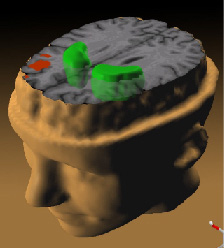Schizophrenia
Schizophrenia is a severe mental illness characterized by persistent defects in the perception or expression of reality. A person experiencing untreated schizophrenia typically demonstrates grossly disorganized thinking, and may also experience delusions or auditory hallucinations. more...
Although the illness primarily affects cognition, it can also contribute to chronic problems with behavior or emotions. Due to the many possible combinations of symptoms, it is difficult to say whether it is in fact a single psychiatric disorder; and Eugen Bleuler deliberately called the disease "the schizophrenias" (plural) when he coined the present name.
Diagnosis is based on the self-reported experiences of the patient, in combination with secondary signs observed by a psychiatrist or other competent clinician such as a doctor of psychology. There is no objective biological test for schizophrenia, though studies suggest that genetics and biochemistry are important contributing factors. Current research into the development of the disorder often focuses on the role of neurobiology, although a reliable and identifiable organic cause has not been found. In the absence of objective laboratory tests to confirm the diagnosis, some question the legitimacy of schizophrenia's status as a disease.
The term "schizophrenia" translates roughly as "shattered mind," and comes from the Greek σχίζω (schizo, "to split" or "to divide") and φρήν (phrēn, "mind"). Despite its etymology, schizophrenia is not synonymous with dissociative identity disorder, also known as multiple personality disorder or "split personality"; in popular culture the two are often confused. Although schizophrenia often leads to social or occupational dysfunction, there is little association of the illness with a predisposition toward aggressive behavior.
Overview
Schizophrenia is often described in terms of "positive" and "negative" symptoms. Positive symptoms include delusions, auditory hallucinations and thought disorder and are typically regarded as manifestations of psychosis. Negative symptoms are so named because they are considered to be the loss or absence of normal traits or abilities, and include features such as flat, blunted or constricted affect and emotion, poverty of speech and lack of motivation. Some models of schizophrenia include formal thought disorder and planning difficulties in a third group, a "disorganization syndrome."
Additionally, neurocognitive deficits may be present. These may take the form of reduced or impaired psychological functions such as memory, attention, problem-solving, executive function or social cognition.
Onset of schizophrenia typically occurs in late adolescence or early adulthood, with males tending to show symptoms earlier than females.
Psychiatrist Emil Kraepelin was the first to draw a distinction between what he termed dementia praecox ("premature dementia") and other psychotic illnesses. In 1911, "dementia praecox" was renamed "schizophrenia" by psychiatrist Eugen Bleuler, who found Kraepelin's term to be misleading, as the disorder is not a form of dementia, premature or otherwise.
Read more at Wikipedia.org




